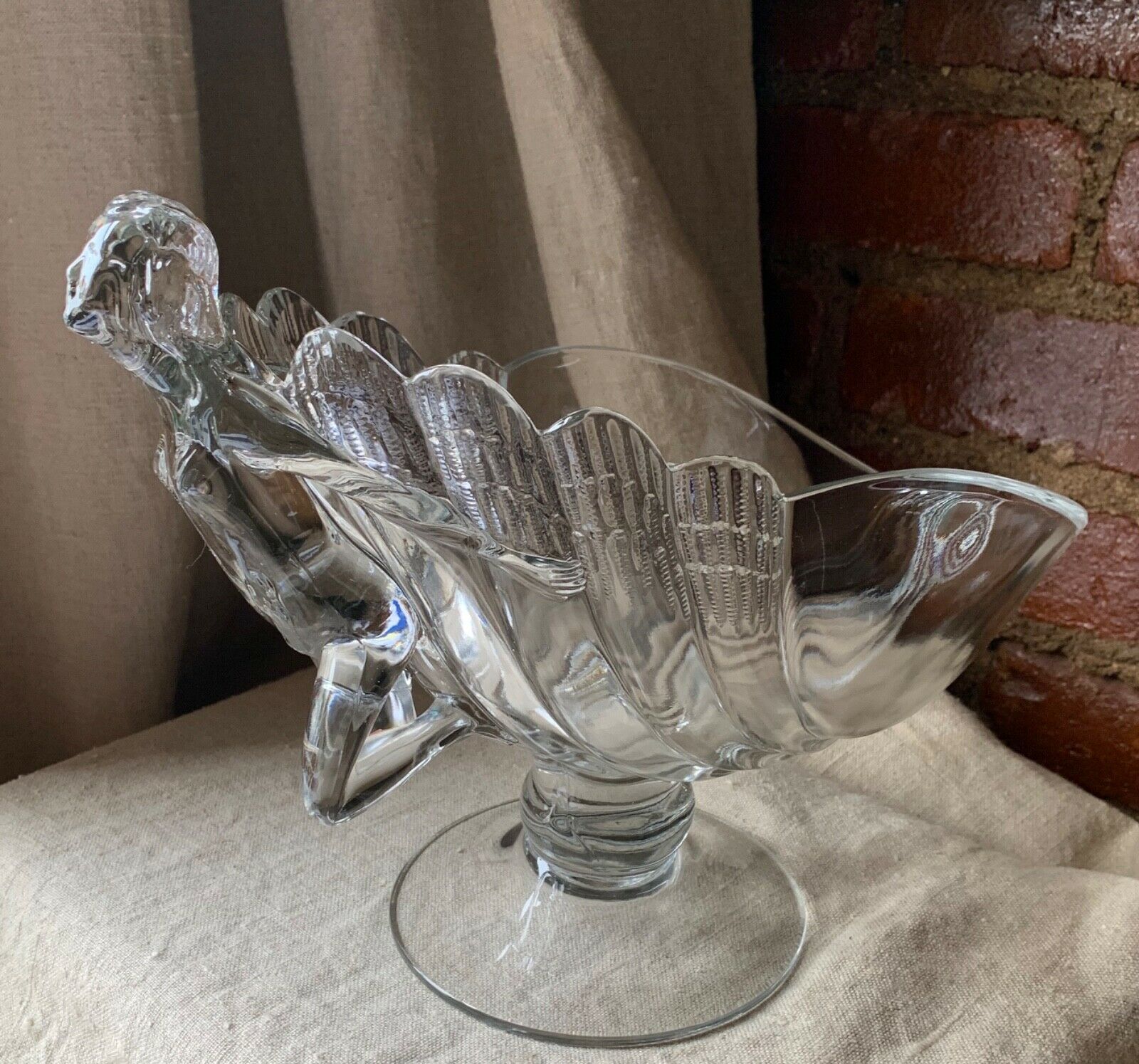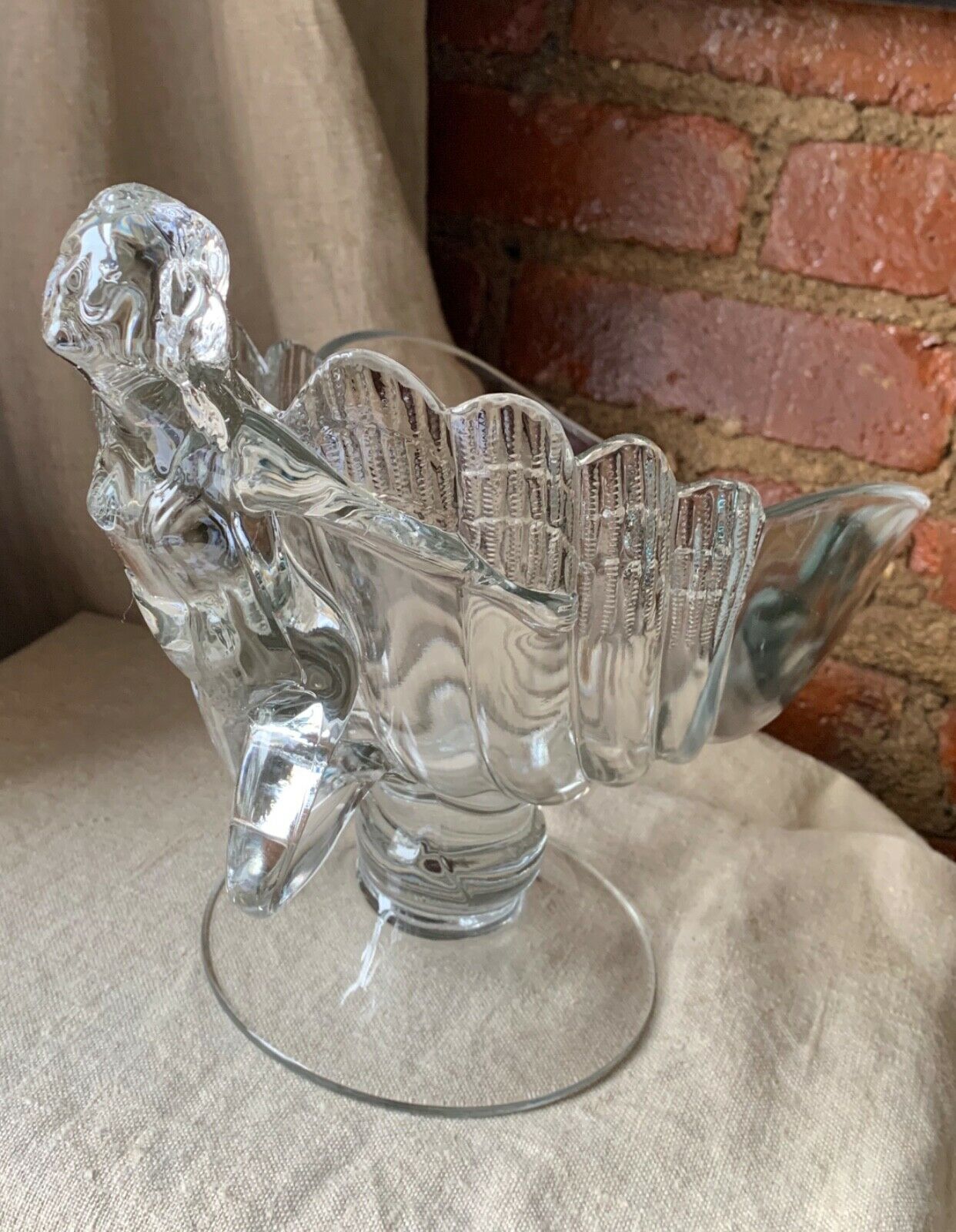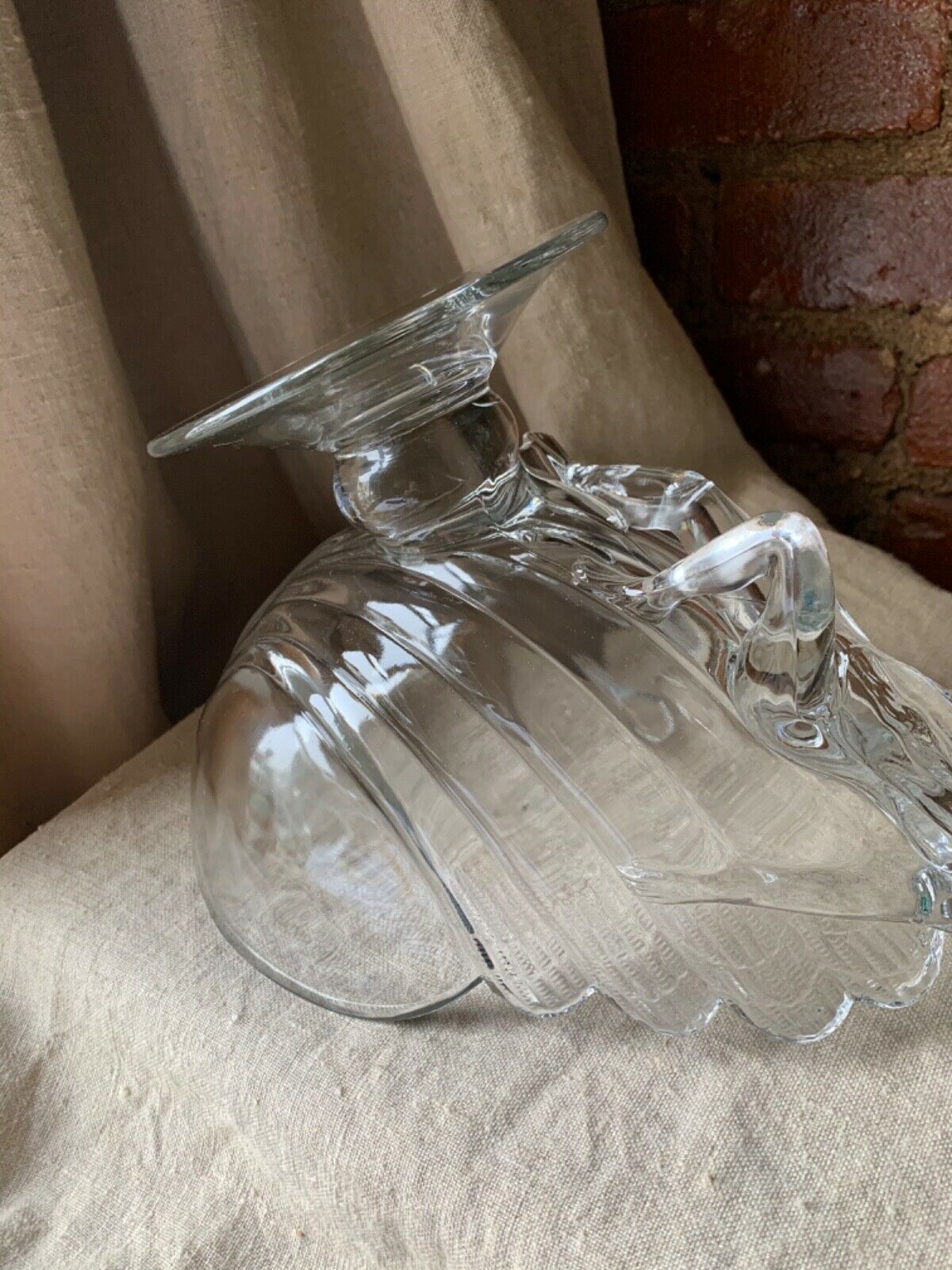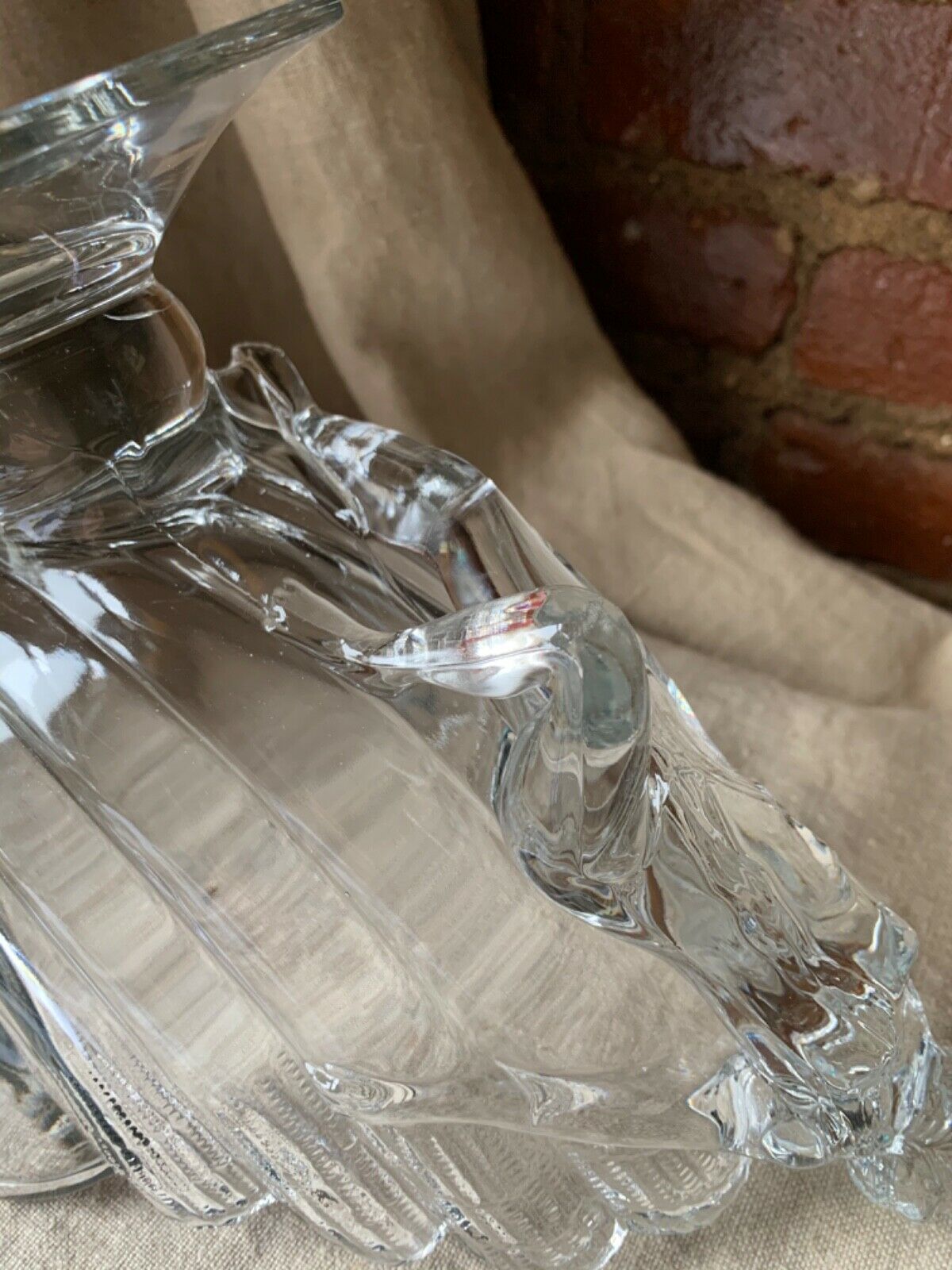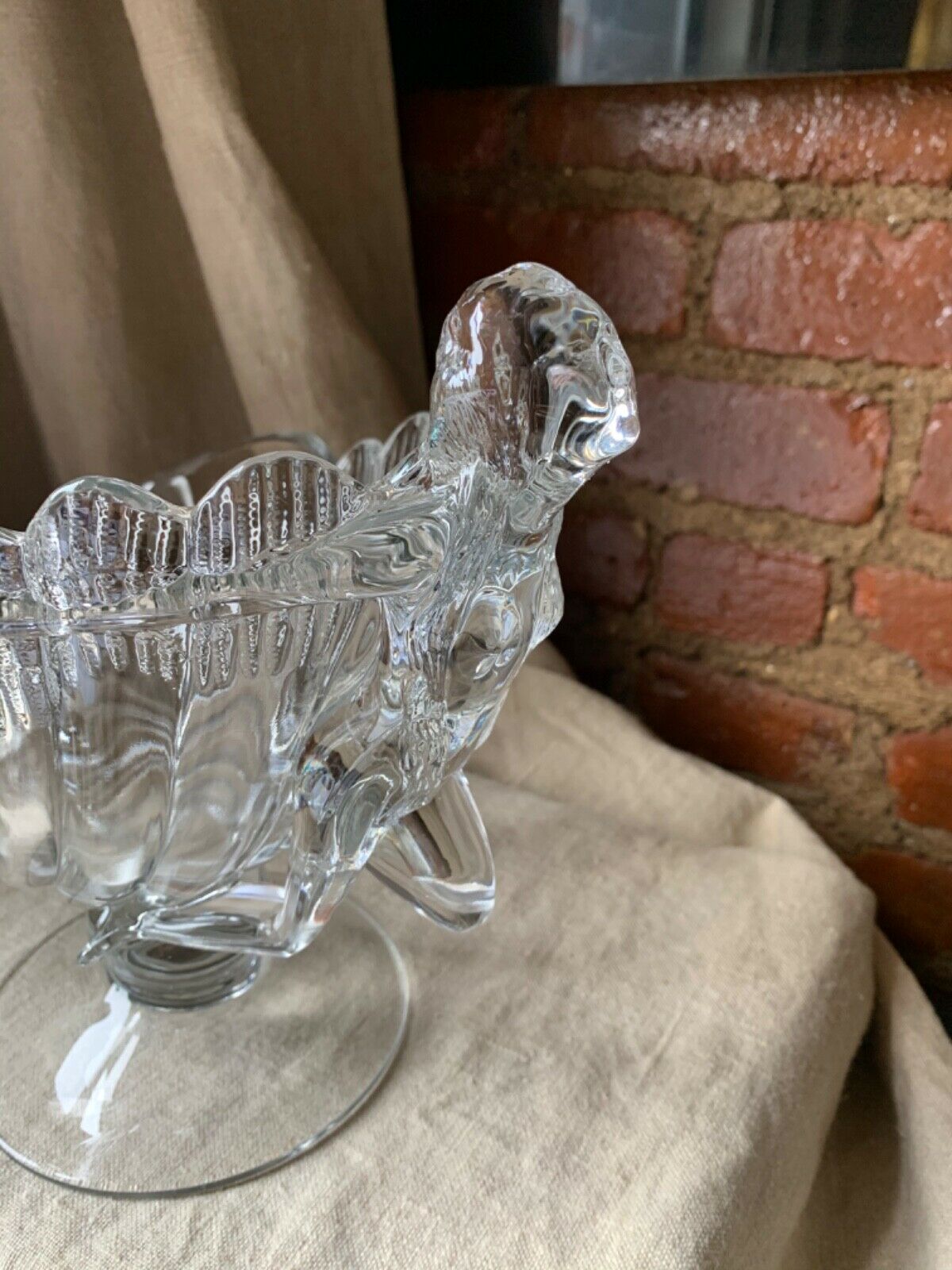-40%
Rare Antique Deco Cambridge art glass Crystal Clear flying nude compote Bowl
$ 1108.8
- Description
- Size Guide
Description
Offered here is this stunning piece of Cambridge Glass is known as The Flying Lady Fruit Bowl.It is one of the most collectible designs in a long line of beautiful Cambridge Glass creations.
Produced in the late 1930's this large pedestal centerpiece bowl stands 9-1/2" high at the lady's head. It is 12-1/2" long and 7" wide.
The lovely is done in crystal clear glass ( it’s so rare ) rather than the soft pink flesh colored milk glass was called both Crown Tuscan and Coral by the Cambridge Glass Company. I have also seen it referred to as Shell Pink.
This is an elegant art glass design that flows with the position of the nude and swept back design of the shell bowl. No makers mark.
This beautiful deco designed bowl is sometimes called both the Statuesque Line Fruit Bowl and the Mermaid Nautilus Pedestal Shell.
The bowl is the epitome of the 1930's art deco trend - an oblong shell-shaped centerpiece compote bowl with a nude maiden poised on the front of the shell like a ship's figurehead.
The excellent details in the nude female form and the original design of the shell bowl have been key in creating an increasingly hot market in Cambridge's figural items. The interesting story of the creation of this beautiful item has become a romantic legend among Cambridge collectors. It seems that the townspeople of Cambridge, Ohio had become infatuated with a lovely German trapeze artist who was performing with a visiting Circus. The glass artists at the Cambridge Glass Company created this beautiful bowl as a way of honoring her--thus
the name Flying Lady.The bowl is in excellent condition. I find no nicks, cracks, chips or repairs. This incredibly beautiful bowl would make a fine addition to a Cambridge Glass collection or a lovely centerpiece display. What a wonderful gift for the Cambridge collector!
In the late 30s, estimated at between 1936 and 1937, the Cambridge Glass Company introduced a flower/fruit centerpiece bowl in the Statuesque Line. This beautiful oblong shell-shaped footed bowl features at the front, a nude sea maiden with flowing hair partially covering her breasts and body. Her arms are outflung towards the rear of the bowl, as if supporting it, and one knee, the left one, is raised with her foot supported on the shell.
The "Flying Lady" bowl has been found in carmen, royal blue, moonlight blue, amethyst, amber, forest green, crown tuscan, decorated crown tuscan, crystal, frosted crystal and windsor blue. I have seen it featured in a 1930's magazine article for Diamond walnuts in light emerald green but have never found it in that color, nor have I ever spoken with anyone who has seen it in this
Like anything else, there is always the potential of other colors surfacing which makes the treasure hunt for these beautiful and elusive items so much fun.
Most usually found are the crown tuscan undecorated bowls. Values encompass a large range with the undecorated crown tuscan being the least expensive and the Crystal clear & royal blue at the highest end of the spectrum.
Research shows the "Flying Lady" bowl was no longer being produced when the factory closed in 1954, but we are unsure of exactly when they stopped making her. We do know that the mold for this piece was sold to the Imperial Glass Company when Cambridge closed its doors for the last time. In 1984 when Imperial went out of business, they offered the Cambridge maids far sale. Unfortunately, prior to the National Cambridge Collectors Club mold purchases from Imperial, they had already sold the "Flying Lady" bowl mold to the owner of Summit Art Glass.
The "Flying Lady" bowl has not been reproduced. One of the reasons is that although the body and shell were molded, the single center foot is blown. We believe the cost of reproduction and the difficulty presented in doing so due to the foot have thus far protected this lovely lady's place in history.
In any great area of collecting there are the stories that become the stuff of legends. Dealers repeat them innumerable times to customers at shows and shops. Collector’s clubs depend on the subject matter. Collections are started based on the enchantment that a much-told and endearing story can generate.
In the area of elegant glass one of the most fascinating stories, or myths, depending on your point of view, surrounds the origin of one of the Cambridge Glass Companies most famous pieces. The unique history of the Statuesque Line Fruit Bowl, or Flying Lady Bowl as it is known to most collectors, is a story of a town’s infatuation with a circus performer and their way of conferring honor to her.
Produced in the late 30’s (the best guesses are about 1936-37), the Statuesque Line Fruit Bowl was another effort, in a long line of attempts, by the Cambridge Company to bridge the gap between functional glass and art glass. At 8 inches tall, the fruit bowl came in at least eleven different colors, and was the picture of the time period’s art deco trend – an oblong shell-shaped centerpiece compote bowl with a nude maiden poised on the front of the shell like an old ship’s figurehead.
The excellent detail in the female form and the original design of the Fruit Bowl have been key over the years in creating an increasingly hot market in Cambridge’s figural items, such as nude stems and flower frogs, but more important to collector’s is the conversation piece it makes. Beauty makes it collectable but the story behind its namesake makes it memorable.
As the legend goes, a circus arrived in the small town of Cambridge, Ohio just prior to Cambridge’s introduction of the Statuesque Line Fruit Bowl. And while the circus was in progress apparently a German female trapeze artist so entranced her audience with her performance and personality that the townspeople, many of whom were artisans and workers at the Cambridge factory, felt that she should be honored in some way. Consequently, the Statuesque fruit bowl, which was marketed shortly after the circus left town, was dubbed the Flying Lady Bowl after her acrobatic expertise.
Interestingly enough, many of the original glass workers who have been interviewed since the factory closed in 1954, and who remember the German trapeze artist, have also described how a certain amount of caution was necessary to display the piece in their homes. Many said that due to the somewhat risqué nature of the piece that they would hide the Fruit Bowl in their cellars when the minister made house calls – giving the item an even greater appeal because of its “daring” design.
For more information on the Flying Lady Bowl and other Cambridge items visit the Cambridge Collectors Society on-line and Colors in Cambridge Glass and Elegant Glassware of the Depression Era.
